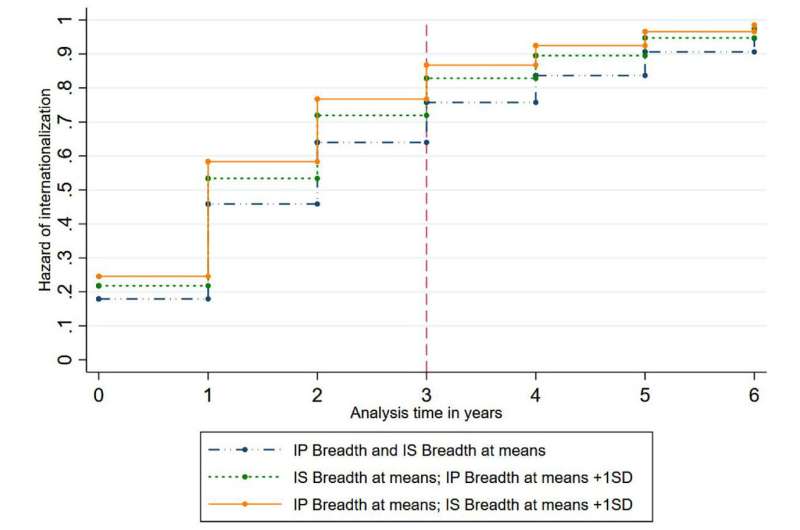This article has been reviewed according to Science X's editorial process and policies. Editors have highlighted the following attributes while ensuring the content's credibility:
fact-checked
trusted source
proofread
Technology start-ups with research experience have faster international success, study finds

The first years are the most crucial ones for technology start-ups. They need to establish themselves on the market, build up a reputation and gain an international foothold as early as possible. The same applies to companies that are founded out of a research institution such as a university.
"On average, academic spin-offs need about three years to achieve their first international sales," says Prof. Dr. Achim Walter from the Kiel Institute for Responsible Innovation (KIRI) at Kiel University. That doesn't sound so long at first. "But you have to bear in mind that the initial period without reliable customer demand is a big strain on the new company."
Together with his colleague Dr. Monika Sienknecht and partners from Copenhagen Business School and Wilfried Laurier University in Canada, he has followed the development of 163 academic spin-offs over an observation period of 18 years. The results of the study have now been published in the journal Entrepreneurship Theory and Practice.
Experience from cooperative research projects provides a time advantage
In 2005, the researchers began with initial surveys and the evaluation of career data from 487 founders. "Start-up teams whose members gained cooperation experience with more than six industrial partners or with more than two international researchers during their time at a research institution shorten the time until the first foreign turnover by more than half," Professor Walter summarizes the results of the study. Spin-offs with this cooperation experience during the research period thus achieve faster international success.
Most of the spin-offs were founded by doctoral candidates. "They already acquire valuable skills for early and successful internationalization of their later spin-offs through research projects, if these are designed cooperatively," says Professor Walter.
"This enables them to achieve a considerable acceleration in the internationalization of their business activities. For the sale of innovative products based on the latest research results in particular, it is very important to quickly get some kind of 'proof of concept' from customers abroad."
"The results of the study confirm the CAU's strategy of intensifying support measures for spin-offs. They show that start-ups from science and academia in particular can make an important contribution to economic growth in Schleswig-Holstein with their above-average development," says Axel Koch, Head of the Transfer Department at the CAU.
Internationalization is extremely important for many start-ups
ibidi GmbH is one of the spin-offs studied, which is based in Munich and produces tech solutions for visualizing cell movements. "It was important for us to supply to the U.S. as quickly as possible [after founding in 2001]. It was hard to sell anything in Germany at first. As the saying goes, a prophet has no honor in his own country. In addition to this, customers in Germany are very hesitant and cautious about new products. In the U.S., people were more curious and wanted to learn from us," says Dr. Valentin Kahl, CEO of ibidi, which now employs almost 110 people and is active in more than 40 countries.
Once founded, academic spin-offs are often successful
The study also shows that in this country, academic spin-offs have good chances of remaining in the market, with their primarily research-driven experience. 106 of the 163 companies (approx. 65 percent) survived during the study period, and ten were taken over by other companies (approx. six percent).
Only 47 left the market (approx. 29 percent). International studies also attest to a very high survival rate for academic spin-offs, which can be around 80 percent or higher within the first five years. In comparison: the general survival rate of start-ups in Germany after five years is about 37 percent (Federal Statistical Office: business demography according to the business register, Wiesbaden 2022).
"These results are really encouraging with regard to career prospects for scientists. They show that a scientific occupation offers good conditions for being successful in this field as well. The fact that this is especially true if the qualification phases have provided the students with their own international and intercultural experience is an important aspect for the career counseling services at the Postdoc Center, which we will also consider in the future," explains Dr. Gesche Braker, Director of the Postdoc Center at the CAU.
One advantage of academic spin-offs is that they are often launched with the help of funding and on the basis of the latest technology. In addition, the start-up is usually well thought out, i.e. not out of a dire starting situation, but after more than a year of intensive preparation, which includes a thorough examination of the market situation. At the CAU, the Centre for Entrepreneurship (ZfE), which is part of the Transfer Department, advises scientists who want to take this step and head in this direction.
More information: Achim Walter et al, Leveraging the Lab: How Pre-Founding R&D Collaboration Influences the Internationalization Timing of Academic Spin-Offs, Entrepreneurship Theory and Practice (2022). DOI: 10.1177/10422587221141678
Provided by Kiel University





















